Strategic Planning for the Hospitality Industry
VerifiedAdded on 2023/01/16
|12
|3984
|32
AI Summary
This document discusses strategic planning in the hospitality industry, including factors affecting successful implementation of strategies, evaluation of performance metrics, and managing strategic change. It provides insights into leadership, structural design, information and control systems, and human resource management. The document also includes a SWOT and PEST analysis of IBIS Hotels. Find comprehensive study material, assignments, and essays on strategic planning for the hospitality industry at Desklib.
Contribute Materials
Your contribution can guide someone’s learning journey. Share your
documents today.
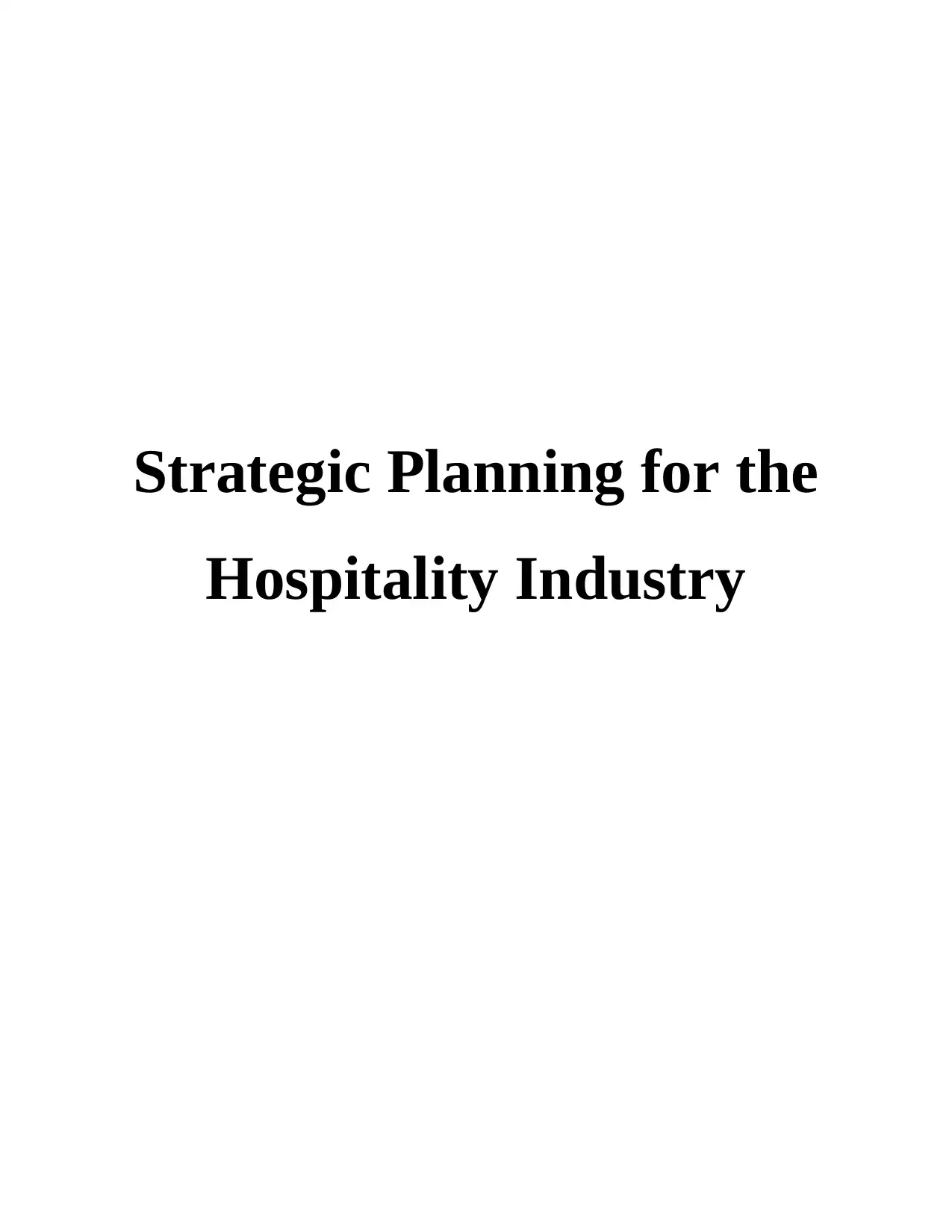
Strategic Planning for the
Hospitality Industry
Hospitality Industry
Secure Best Marks with AI Grader
Need help grading? Try our AI Grader for instant feedback on your assignments.
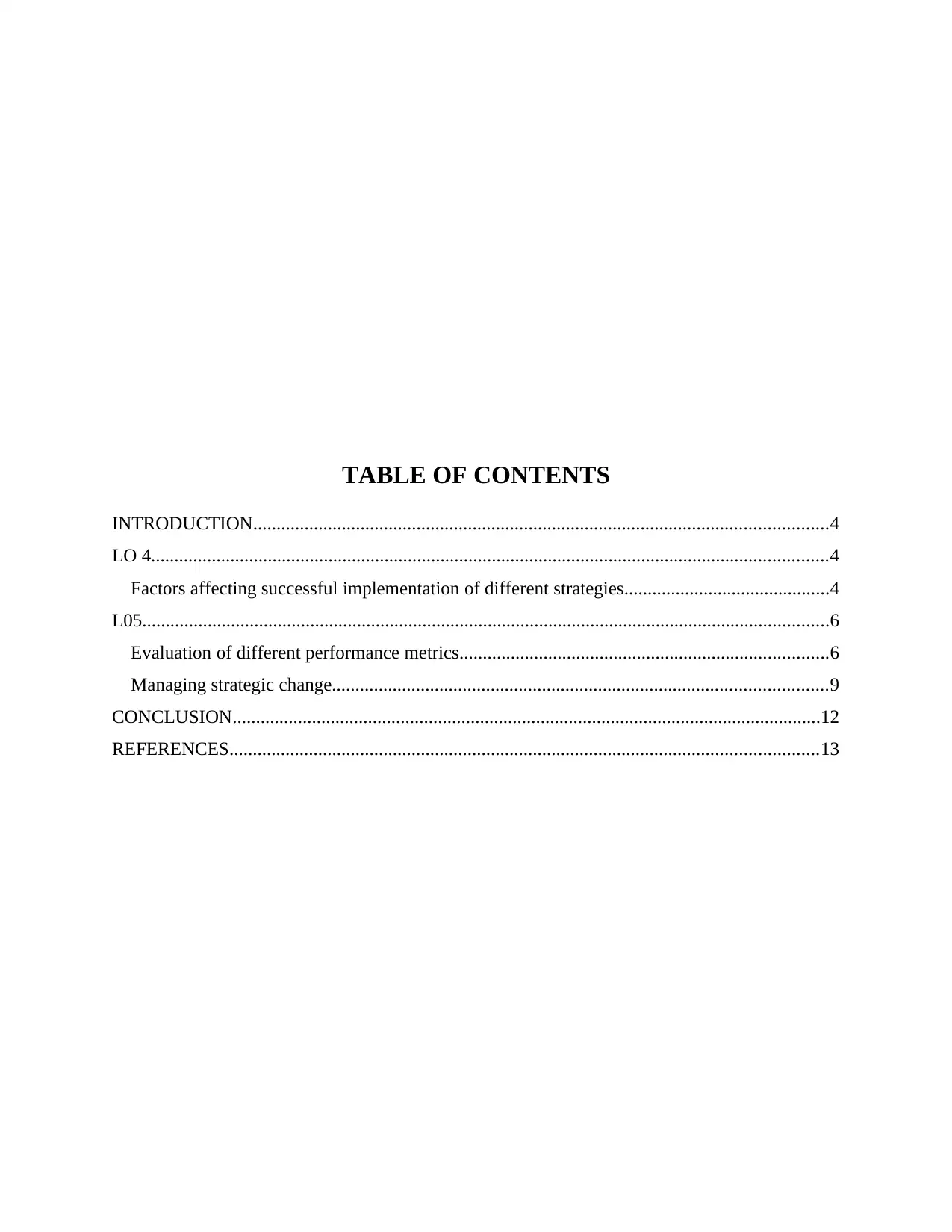
TABLE OF CONTENTS
INTRODUCTION...........................................................................................................................4
LO 4.................................................................................................................................................4
Factors affecting successful implementation of different strategies............................................4
L05...................................................................................................................................................6
Evaluation of different performance metrics...............................................................................6
Managing strategic change..........................................................................................................9
CONCLUSION..............................................................................................................................12
REFERENCES..............................................................................................................................13
INTRODUCTION...........................................................................................................................4
LO 4.................................................................................................................................................4
Factors affecting successful implementation of different strategies............................................4
L05...................................................................................................................................................6
Evaluation of different performance metrics...............................................................................6
Managing strategic change..........................................................................................................9
CONCLUSION..............................................................................................................................12
REFERENCES..............................................................................................................................13
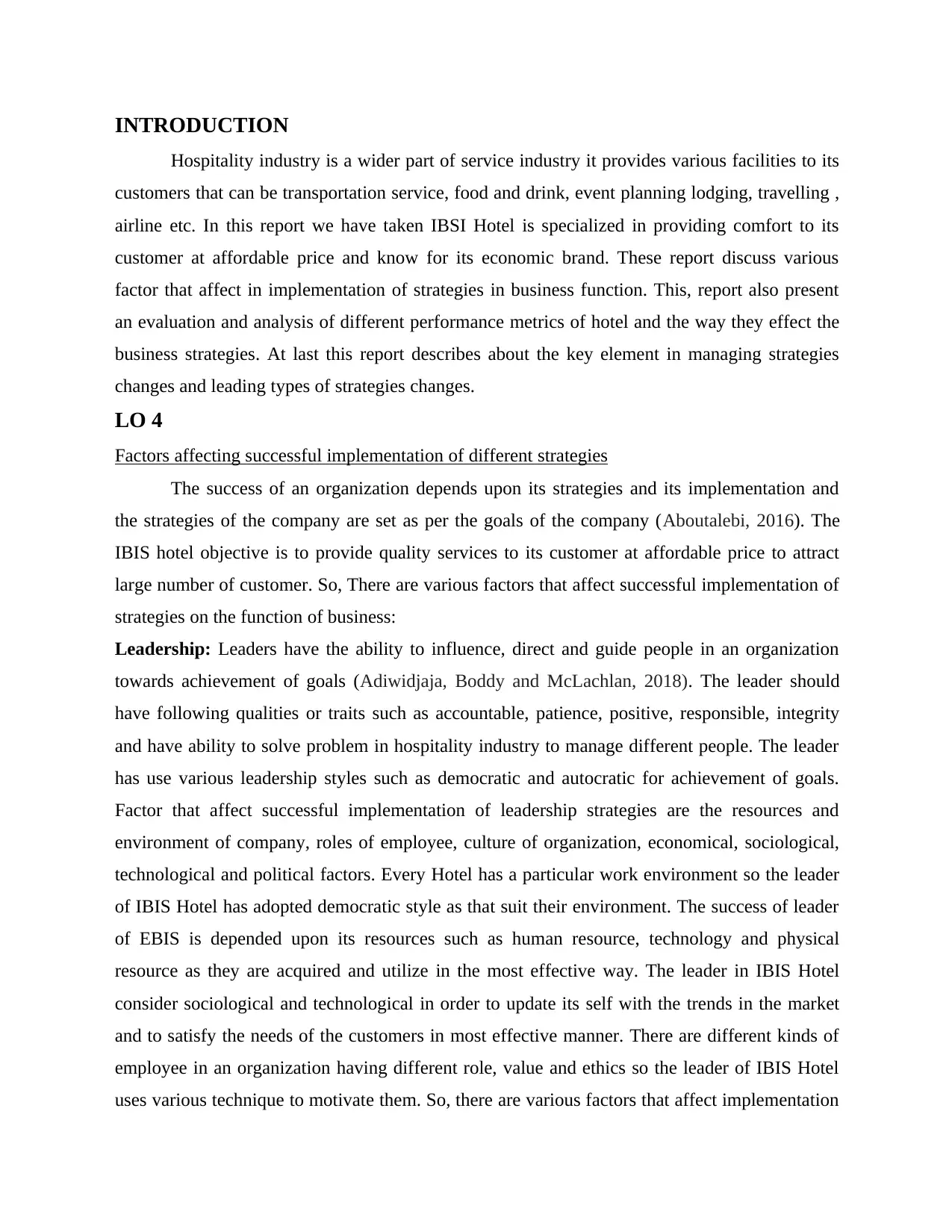
INTRODUCTION
Hospitality industry is a wider part of service industry it provides various facilities to its
customers that can be transportation service, food and drink, event planning lodging, travelling ,
airline etc. In this report we have taken IBSI Hotel is specialized in providing comfort to its
customer at affordable price and know for its economic brand. These report discuss various
factor that affect in implementation of strategies in business function. This, report also present
an evaluation and analysis of different performance metrics of hotel and the way they effect the
business strategies. At last this report describes about the key element in managing strategies
changes and leading types of strategies changes.
LO 4
Factors affecting successful implementation of different strategies
The success of an organization depends upon its strategies and its implementation and
the strategies of the company are set as per the goals of the company (Aboutalebi, 2016). The
IBIS hotel objective is to provide quality services to its customer at affordable price to attract
large number of customer. So, There are various factors that affect successful implementation of
strategies on the function of business:
Leadership: Leaders have the ability to influence, direct and guide people in an organization
towards achievement of goals (Adiwidjaja, Boddy and McLachlan, 2018). The leader should
have following qualities or traits such as accountable, patience, positive, responsible, integrity
and have ability to solve problem in hospitality industry to manage different people. The leader
has use various leadership styles such as democratic and autocratic for achievement of goals.
Factor that affect successful implementation of leadership strategies are the resources and
environment of company, roles of employee, culture of organization, economical, sociological,
technological and political factors. Every Hotel has a particular work environment so the leader
of IBIS Hotel has adopted democratic style as that suit their environment. The success of leader
of EBIS is depended upon its resources such as human resource, technology and physical
resource as they are acquired and utilize in the most effective way. The leader in IBIS Hotel
consider sociological and technological in order to update its self with the trends in the market
and to satisfy the needs of the customers in most effective manner. There are different kinds of
employee in an organization having different role, value and ethics so the leader of IBIS Hotel
uses various technique to motivate them. So, there are various factors that affect implementation
Hospitality industry is a wider part of service industry it provides various facilities to its
customers that can be transportation service, food and drink, event planning lodging, travelling ,
airline etc. In this report we have taken IBSI Hotel is specialized in providing comfort to its
customer at affordable price and know for its economic brand. These report discuss various
factor that affect in implementation of strategies in business function. This, report also present
an evaluation and analysis of different performance metrics of hotel and the way they effect the
business strategies. At last this report describes about the key element in managing strategies
changes and leading types of strategies changes.
LO 4
Factors affecting successful implementation of different strategies
The success of an organization depends upon its strategies and its implementation and
the strategies of the company are set as per the goals of the company (Aboutalebi, 2016). The
IBIS hotel objective is to provide quality services to its customer at affordable price to attract
large number of customer. So, There are various factors that affect successful implementation of
strategies on the function of business:
Leadership: Leaders have the ability to influence, direct and guide people in an organization
towards achievement of goals (Adiwidjaja, Boddy and McLachlan, 2018). The leader should
have following qualities or traits such as accountable, patience, positive, responsible, integrity
and have ability to solve problem in hospitality industry to manage different people. The leader
has use various leadership styles such as democratic and autocratic for achievement of goals.
Factor that affect successful implementation of leadership strategies are the resources and
environment of company, roles of employee, culture of organization, economical, sociological,
technological and political factors. Every Hotel has a particular work environment so the leader
of IBIS Hotel has adopted democratic style as that suit their environment. The success of leader
of EBIS is depended upon its resources such as human resource, technology and physical
resource as they are acquired and utilize in the most effective way. The leader in IBIS Hotel
consider sociological and technological in order to update its self with the trends in the market
and to satisfy the needs of the customers in most effective manner. There are different kinds of
employee in an organization having different role, value and ethics so the leader of IBIS Hotel
uses various technique to motivate them. So, there are various factors that affect implementation
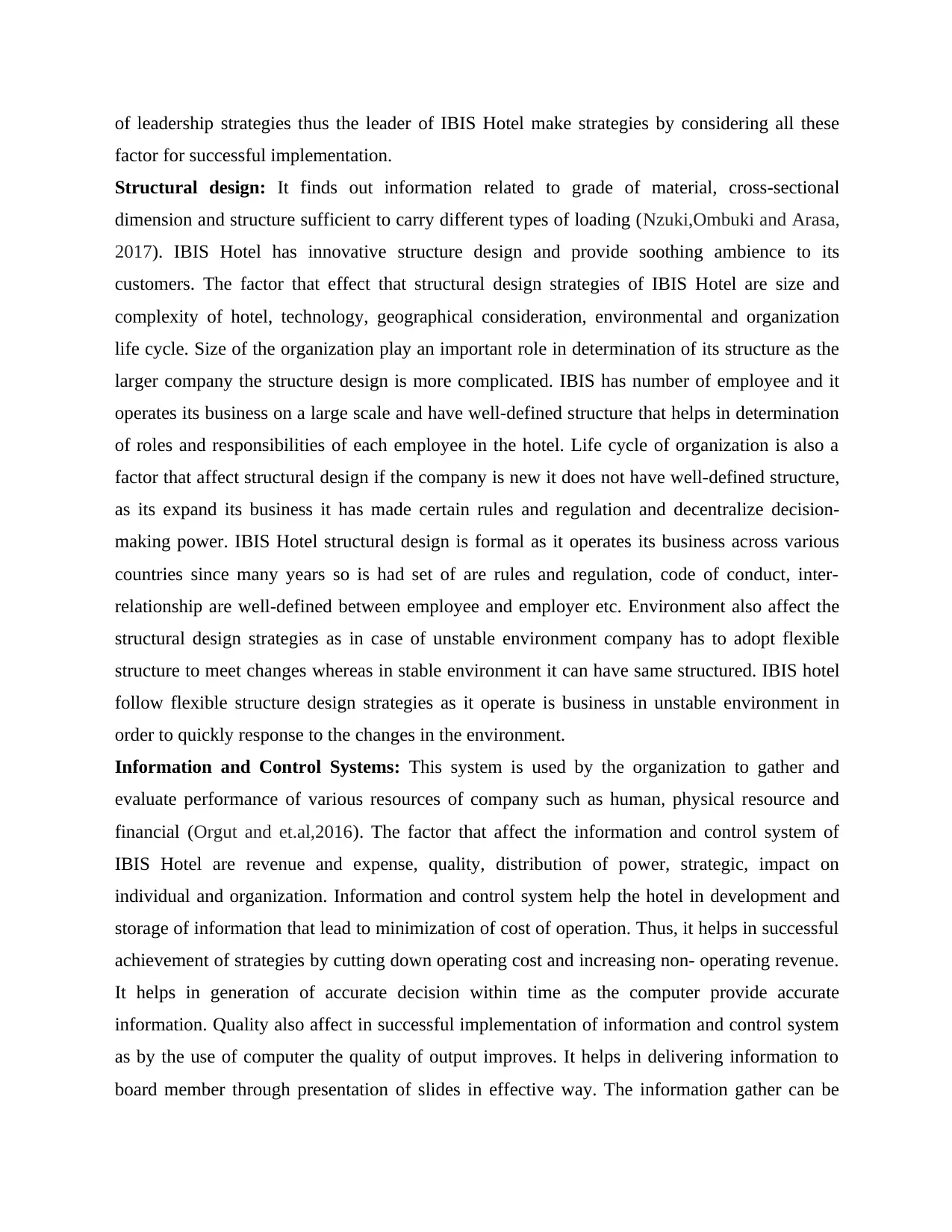
of leadership strategies thus the leader of IBIS Hotel make strategies by considering all these
factor for successful implementation.
Structural design: It finds out information related to grade of material, cross-sectional
dimension and structure sufficient to carry different types of loading (Nzuki,Ombuki and Arasa,
2017). IBIS Hotel has innovative structure design and provide soothing ambience to its
customers. The factor that effect that structural design strategies of IBIS Hotel are size and
complexity of hotel, technology, geographical consideration, environmental and organization
life cycle. Size of the organization play an important role in determination of its structure as the
larger company the structure design is more complicated. IBIS has number of employee and it
operates its business on a large scale and have well-defined structure that helps in determination
of roles and responsibilities of each employee in the hotel. Life cycle of organization is also a
factor that affect structural design if the company is new it does not have well-defined structure,
as its expand its business it has made certain rules and regulation and decentralize decision-
making power. IBIS Hotel structural design is formal as it operates its business across various
countries since many years so is had set of are rules and regulation, code of conduct, inter-
relationship are well-defined between employee and employer etc. Environment also affect the
structural design strategies as in case of unstable environment company has to adopt flexible
structure to meet changes whereas in stable environment it can have same structured. IBIS hotel
follow flexible structure design strategies as it operate is business in unstable environment in
order to quickly response to the changes in the environment.
Information and Control Systems: This system is used by the organization to gather and
evaluate performance of various resources of company such as human, physical resource and
financial (Orgut and et.al,2016). The factor that affect the information and control system of
IBIS Hotel are revenue and expense, quality, distribution of power, strategic, impact on
individual and organization. Information and control system help the hotel in development and
storage of information that lead to minimization of cost of operation. Thus, it helps in successful
achievement of strategies by cutting down operating cost and increasing non- operating revenue.
It helps in generation of accurate decision within time as the computer provide accurate
information. Quality also affect in successful implementation of information and control system
as by the use of computer the quality of output improves. It helps in delivering information to
board member through presentation of slides in effective way. The information gather can be
factor for successful implementation.
Structural design: It finds out information related to grade of material, cross-sectional
dimension and structure sufficient to carry different types of loading (Nzuki,Ombuki and Arasa,
2017). IBIS Hotel has innovative structure design and provide soothing ambience to its
customers. The factor that effect that structural design strategies of IBIS Hotel are size and
complexity of hotel, technology, geographical consideration, environmental and organization
life cycle. Size of the organization play an important role in determination of its structure as the
larger company the structure design is more complicated. IBIS has number of employee and it
operates its business on a large scale and have well-defined structure that helps in determination
of roles and responsibilities of each employee in the hotel. Life cycle of organization is also a
factor that affect structural design if the company is new it does not have well-defined structure,
as its expand its business it has made certain rules and regulation and decentralize decision-
making power. IBIS Hotel structural design is formal as it operates its business across various
countries since many years so is had set of are rules and regulation, code of conduct, inter-
relationship are well-defined between employee and employer etc. Environment also affect the
structural design strategies as in case of unstable environment company has to adopt flexible
structure to meet changes whereas in stable environment it can have same structured. IBIS hotel
follow flexible structure design strategies as it operate is business in unstable environment in
order to quickly response to the changes in the environment.
Information and Control Systems: This system is used by the organization to gather and
evaluate performance of various resources of company such as human, physical resource and
financial (Orgut and et.al,2016). The factor that affect the information and control system of
IBIS Hotel are revenue and expense, quality, distribution of power, strategic, impact on
individual and organization. Information and control system help the hotel in development and
storage of information that lead to minimization of cost of operation. Thus, it helps in successful
achievement of strategies by cutting down operating cost and increasing non- operating revenue.
It helps in generation of accurate decision within time as the computer provide accurate
information. Quality also affect in successful implementation of information and control system
as by the use of computer the quality of output improves. It helps in delivering information to
board member through presentation of slides in effective way. The information gather can be
Secure Best Marks with AI Grader
Need help grading? Try our AI Grader for instant feedback on your assignments.
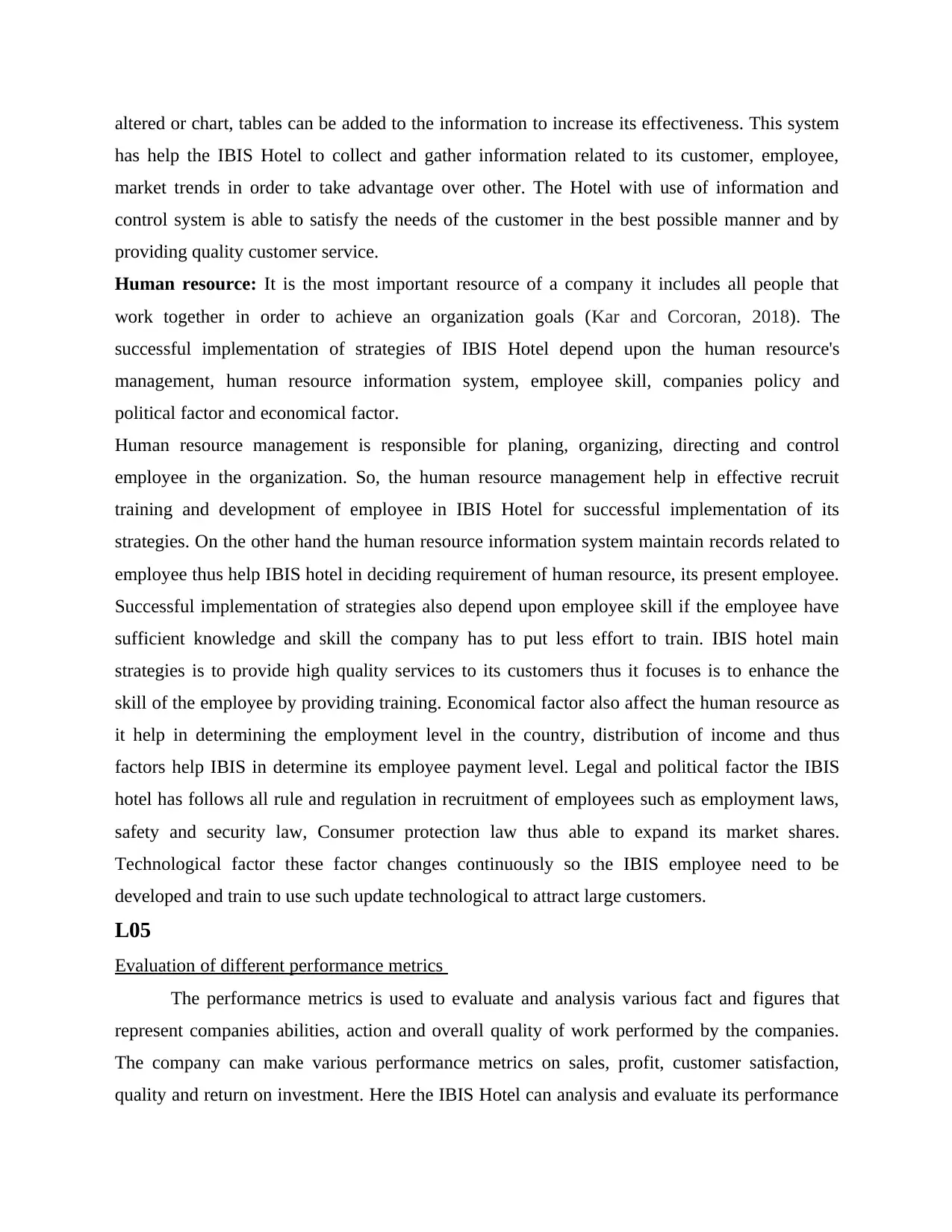
altered or chart, tables can be added to the information to increase its effectiveness. This system
has help the IBIS Hotel to collect and gather information related to its customer, employee,
market trends in order to take advantage over other. The Hotel with use of information and
control system is able to satisfy the needs of the customer in the best possible manner and by
providing quality customer service.
Human resource: It is the most important resource of a company it includes all people that
work together in order to achieve an organization goals (Kar and Corcoran, 2018). The
successful implementation of strategies of IBIS Hotel depend upon the human resource's
management, human resource information system, employee skill, companies policy and
political factor and economical factor.
Human resource management is responsible for planing, organizing, directing and control
employee in the organization. So, the human resource management help in effective recruit
training and development of employee in IBIS Hotel for successful implementation of its
strategies. On the other hand the human resource information system maintain records related to
employee thus help IBIS hotel in deciding requirement of human resource, its present employee.
Successful implementation of strategies also depend upon employee skill if the employee have
sufficient knowledge and skill the company has to put less effort to train. IBIS hotel main
strategies is to provide high quality services to its customers thus it focuses is to enhance the
skill of the employee by providing training. Economical factor also affect the human resource as
it help in determining the employment level in the country, distribution of income and thus
factors help IBIS in determine its employee payment level. Legal and political factor the IBIS
hotel has follows all rule and regulation in recruitment of employees such as employment laws,
safety and security law, Consumer protection law thus able to expand its market shares.
Technological factor these factor changes continuously so the IBIS employee need to be
developed and train to use such update technological to attract large customers.
L05
Evaluation of different performance metrics
The performance metrics is used to evaluate and analysis various fact and figures that
represent companies abilities, action and overall quality of work performed by the companies.
The company can make various performance metrics on sales, profit, customer satisfaction,
quality and return on investment. Here the IBIS Hotel can analysis and evaluate its performance
has help the IBIS Hotel to collect and gather information related to its customer, employee,
market trends in order to take advantage over other. The Hotel with use of information and
control system is able to satisfy the needs of the customer in the best possible manner and by
providing quality customer service.
Human resource: It is the most important resource of a company it includes all people that
work together in order to achieve an organization goals (Kar and Corcoran, 2018). The
successful implementation of strategies of IBIS Hotel depend upon the human resource's
management, human resource information system, employee skill, companies policy and
political factor and economical factor.
Human resource management is responsible for planing, organizing, directing and control
employee in the organization. So, the human resource management help in effective recruit
training and development of employee in IBIS Hotel for successful implementation of its
strategies. On the other hand the human resource information system maintain records related to
employee thus help IBIS hotel in deciding requirement of human resource, its present employee.
Successful implementation of strategies also depend upon employee skill if the employee have
sufficient knowledge and skill the company has to put less effort to train. IBIS hotel main
strategies is to provide high quality services to its customers thus it focuses is to enhance the
skill of the employee by providing training. Economical factor also affect the human resource as
it help in determining the employment level in the country, distribution of income and thus
factors help IBIS in determine its employee payment level. Legal and political factor the IBIS
hotel has follows all rule and regulation in recruitment of employees such as employment laws,
safety and security law, Consumer protection law thus able to expand its market shares.
Technological factor these factor changes continuously so the IBIS employee need to be
developed and train to use such update technological to attract large customers.
L05
Evaluation of different performance metrics
The performance metrics is used to evaluate and analysis various fact and figures that
represent companies abilities, action and overall quality of work performed by the companies.
The company can make various performance metrics on sales, profit, customer satisfaction,
quality and return on investment. Here the IBIS Hotel can analysis and evaluate its performance
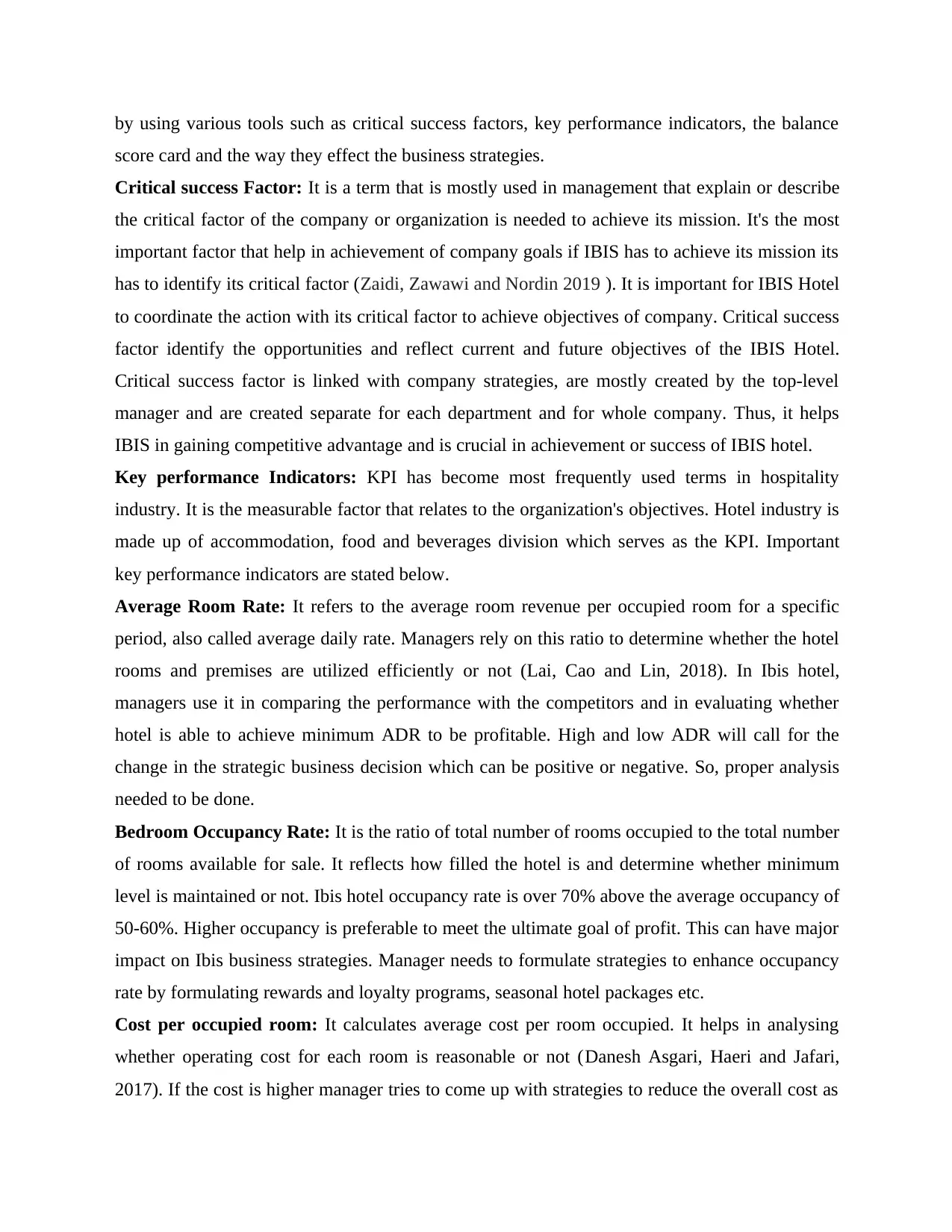
by using various tools such as critical success factors, key performance indicators, the balance
score card and the way they effect the business strategies.
Critical success Factor: It is a term that is mostly used in management that explain or describe
the critical factor of the company or organization is needed to achieve its mission. It's the most
important factor that help in achievement of company goals if IBIS has to achieve its mission its
has to identify its critical factor (Zaidi, Zawawi and Nordin 2019 ). It is important for IBIS Hotel
to coordinate the action with its critical factor to achieve objectives of company. Critical success
factor identify the opportunities and reflect current and future objectives of the IBIS Hotel.
Critical success factor is linked with company strategies, are mostly created by the top-level
manager and are created separate for each department and for whole company. Thus, it helps
IBIS in gaining competitive advantage and is crucial in achievement or success of IBIS hotel.
Key performance Indicators: KPI has become most frequently used terms in hospitality
industry. It is the measurable factor that relates to the organization's objectives. Hotel industry is
made up of accommodation, food and beverages division which serves as the KPI. Important
key performance indicators are stated below.
Average Room Rate: It refers to the average room revenue per occupied room for a specific
period, also called average daily rate. Managers rely on this ratio to determine whether the hotel
rooms and premises are utilized efficiently or not (Lai, Cao and Lin, 2018). In Ibis hotel,
managers use it in comparing the performance with the competitors and in evaluating whether
hotel is able to achieve minimum ADR to be profitable. High and low ADR will call for the
change in the strategic business decision which can be positive or negative. So, proper analysis
needed to be done.
Bedroom Occupancy Rate: It is the ratio of total number of rooms occupied to the total number
of rooms available for sale. It reflects how filled the hotel is and determine whether minimum
level is maintained or not. Ibis hotel occupancy rate is over 70% above the average occupancy of
50-60%. Higher occupancy is preferable to meet the ultimate goal of profit. This can have major
impact on Ibis business strategies. Manager needs to formulate strategies to enhance occupancy
rate by formulating rewards and loyalty programs, seasonal hotel packages etc.
Cost per occupied room: It calculates average cost per room occupied. It helps in analysing
whether operating cost for each room is reasonable or not (Danesh Asgari, Haeri and Jafari,
2017). If the cost is higher manager tries to come up with strategies to reduce the overall cost as
score card and the way they effect the business strategies.
Critical success Factor: It is a term that is mostly used in management that explain or describe
the critical factor of the company or organization is needed to achieve its mission. It's the most
important factor that help in achievement of company goals if IBIS has to achieve its mission its
has to identify its critical factor (Zaidi, Zawawi and Nordin 2019 ). It is important for IBIS Hotel
to coordinate the action with its critical factor to achieve objectives of company. Critical success
factor identify the opportunities and reflect current and future objectives of the IBIS Hotel.
Critical success factor is linked with company strategies, are mostly created by the top-level
manager and are created separate for each department and for whole company. Thus, it helps
IBIS in gaining competitive advantage and is crucial in achievement or success of IBIS hotel.
Key performance Indicators: KPI has become most frequently used terms in hospitality
industry. It is the measurable factor that relates to the organization's objectives. Hotel industry is
made up of accommodation, food and beverages division which serves as the KPI. Important
key performance indicators are stated below.
Average Room Rate: It refers to the average room revenue per occupied room for a specific
period, also called average daily rate. Managers rely on this ratio to determine whether the hotel
rooms and premises are utilized efficiently or not (Lai, Cao and Lin, 2018). In Ibis hotel,
managers use it in comparing the performance with the competitors and in evaluating whether
hotel is able to achieve minimum ADR to be profitable. High and low ADR will call for the
change in the strategic business decision which can be positive or negative. So, proper analysis
needed to be done.
Bedroom Occupancy Rate: It is the ratio of total number of rooms occupied to the total number
of rooms available for sale. It reflects how filled the hotel is and determine whether minimum
level is maintained or not. Ibis hotel occupancy rate is over 70% above the average occupancy of
50-60%. Higher occupancy is preferable to meet the ultimate goal of profit. This can have major
impact on Ibis business strategies. Manager needs to formulate strategies to enhance occupancy
rate by formulating rewards and loyalty programs, seasonal hotel packages etc.
Cost per occupied room: It calculates average cost per room occupied. It helps in analysing
whether operating cost for each room is reasonable or not (Danesh Asgari, Haeri and Jafari,
2017). If the cost is higher manager tries to come up with strategies to reduce the overall cost as
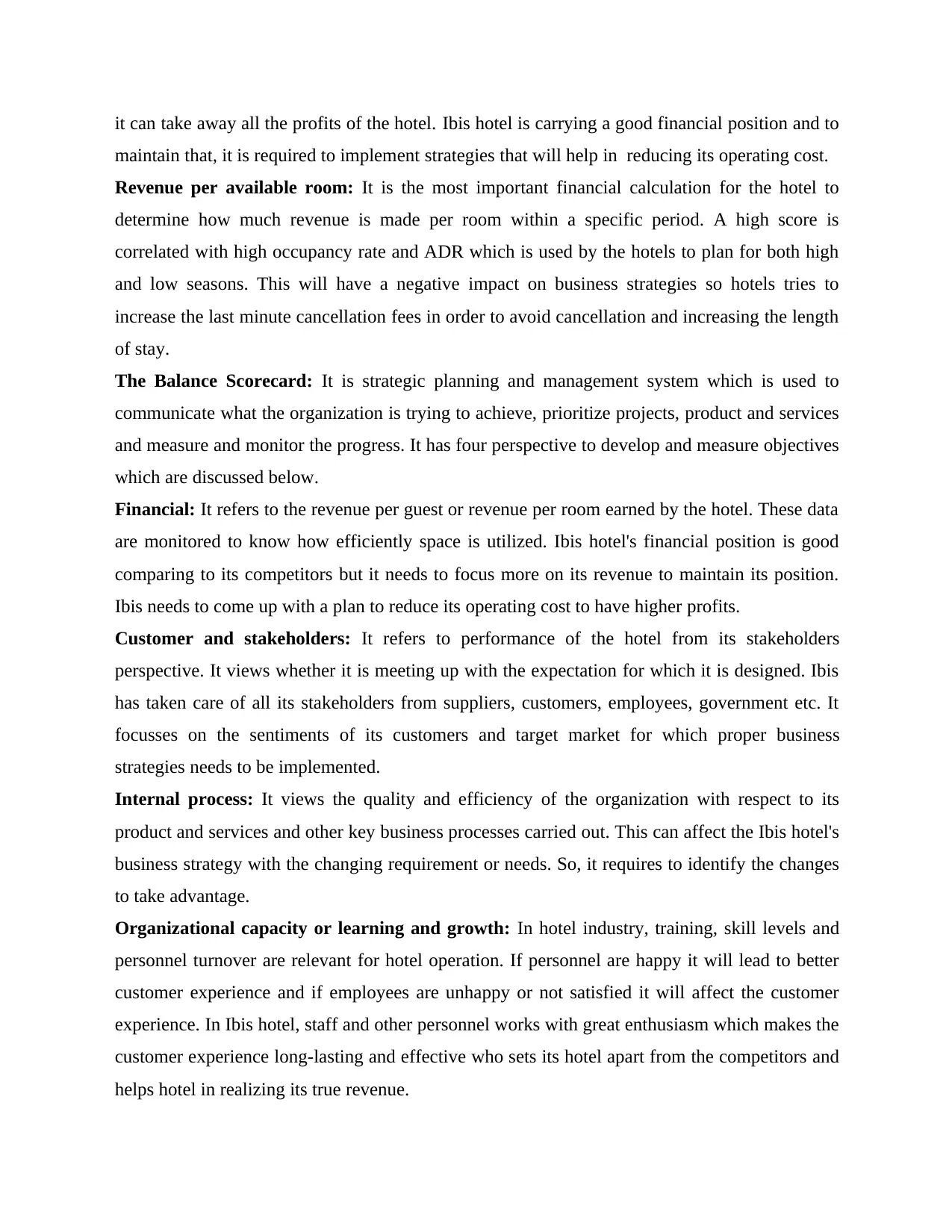
it can take away all the profits of the hotel. Ibis hotel is carrying a good financial position and to
maintain that, it is required to implement strategies that will help in reducing its operating cost.
Revenue per available room: It is the most important financial calculation for the hotel to
determine how much revenue is made per room within a specific period. A high score is
correlated with high occupancy rate and ADR which is used by the hotels to plan for both high
and low seasons. This will have a negative impact on business strategies so hotels tries to
increase the last minute cancellation fees in order to avoid cancellation and increasing the length
of stay.
The Balance Scorecard: It is strategic planning and management system which is used to
communicate what the organization is trying to achieve, prioritize projects, product and services
and measure and monitor the progress. It has four perspective to develop and measure objectives
which are discussed below.
Financial: It refers to the revenue per guest or revenue per room earned by the hotel. These data
are monitored to know how efficiently space is utilized. Ibis hotel's financial position is good
comparing to its competitors but it needs to focus more on its revenue to maintain its position.
Ibis needs to come up with a plan to reduce its operating cost to have higher profits.
Customer and stakeholders: It refers to performance of the hotel from its stakeholders
perspective. It views whether it is meeting up with the expectation for which it is designed. Ibis
has taken care of all its stakeholders from suppliers, customers, employees, government etc. It
focusses on the sentiments of its customers and target market for which proper business
strategies needs to be implemented.
Internal process: It views the quality and efficiency of the organization with respect to its
product and services and other key business processes carried out. This can affect the Ibis hotel's
business strategy with the changing requirement or needs. So, it requires to identify the changes
to take advantage.
Organizational capacity or learning and growth: In hotel industry, training, skill levels and
personnel turnover are relevant for hotel operation. If personnel are happy it will lead to better
customer experience and if employees are unhappy or not satisfied it will affect the customer
experience. In Ibis hotel, staff and other personnel works with great enthusiasm which makes the
customer experience long-lasting and effective who sets its hotel apart from the competitors and
helps hotel in realizing its true revenue.
maintain that, it is required to implement strategies that will help in reducing its operating cost.
Revenue per available room: It is the most important financial calculation for the hotel to
determine how much revenue is made per room within a specific period. A high score is
correlated with high occupancy rate and ADR which is used by the hotels to plan for both high
and low seasons. This will have a negative impact on business strategies so hotels tries to
increase the last minute cancellation fees in order to avoid cancellation and increasing the length
of stay.
The Balance Scorecard: It is strategic planning and management system which is used to
communicate what the organization is trying to achieve, prioritize projects, product and services
and measure and monitor the progress. It has four perspective to develop and measure objectives
which are discussed below.
Financial: It refers to the revenue per guest or revenue per room earned by the hotel. These data
are monitored to know how efficiently space is utilized. Ibis hotel's financial position is good
comparing to its competitors but it needs to focus more on its revenue to maintain its position.
Ibis needs to come up with a plan to reduce its operating cost to have higher profits.
Customer and stakeholders: It refers to performance of the hotel from its stakeholders
perspective. It views whether it is meeting up with the expectation for which it is designed. Ibis
has taken care of all its stakeholders from suppliers, customers, employees, government etc. It
focusses on the sentiments of its customers and target market for which proper business
strategies needs to be implemented.
Internal process: It views the quality and efficiency of the organization with respect to its
product and services and other key business processes carried out. This can affect the Ibis hotel's
business strategy with the changing requirement or needs. So, it requires to identify the changes
to take advantage.
Organizational capacity or learning and growth: In hotel industry, training, skill levels and
personnel turnover are relevant for hotel operation. If personnel are happy it will lead to better
customer experience and if employees are unhappy or not satisfied it will affect the customer
experience. In Ibis hotel, staff and other personnel works with great enthusiasm which makes the
customer experience long-lasting and effective who sets its hotel apart from the competitors and
helps hotel in realizing its true revenue.
Paraphrase This Document
Need a fresh take? Get an instant paraphrase of this document with our AI Paraphraser
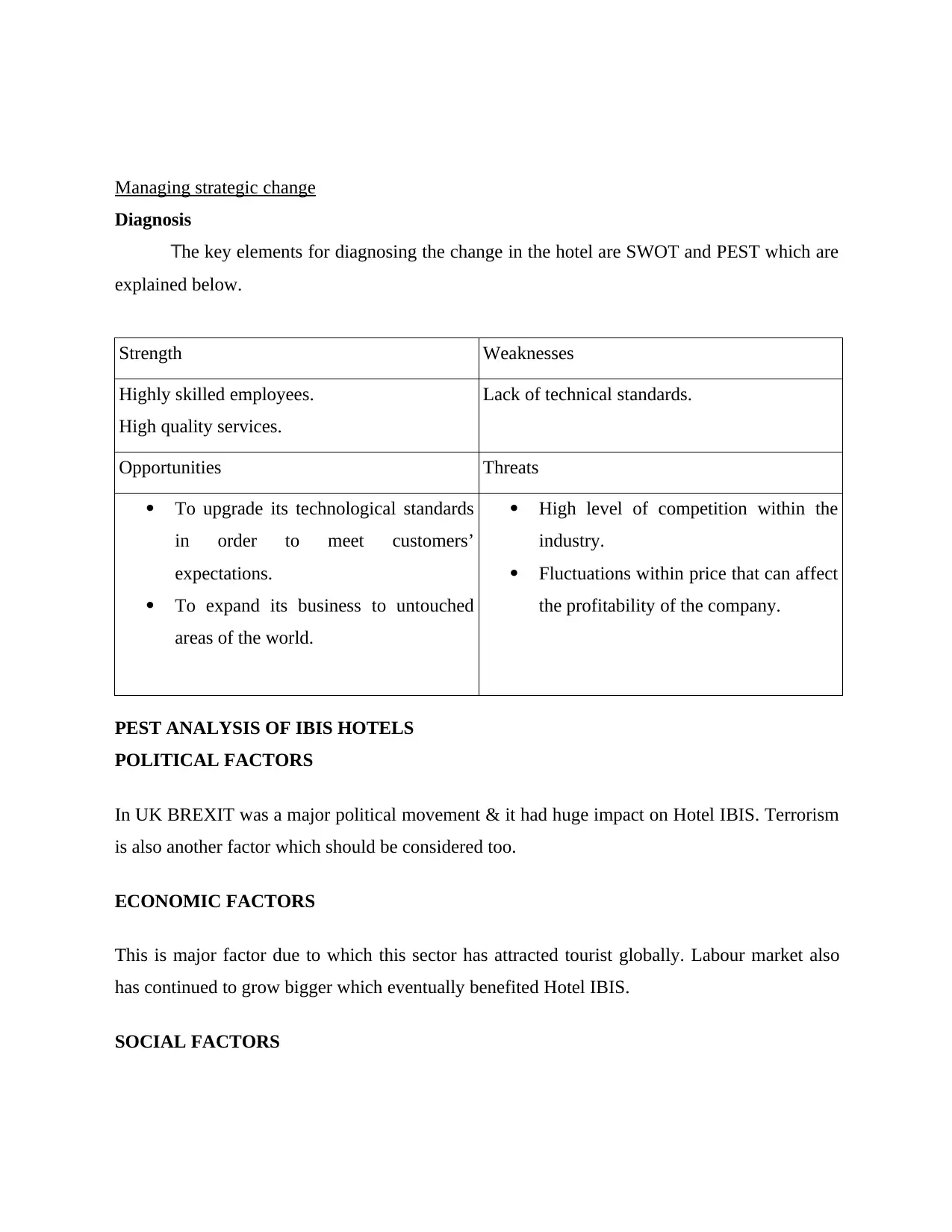
Managing strategic change
Diagnosis
The key elements for diagnosing the change in the hotel are SWOT and PEST which are
explained below.
Strength Weaknesses
Highly skilled employees.
High quality services.
Lack of technical standards.
Opportunities Threats
To upgrade its technological standards
in order to meet customers’
expectations.
To expand its business to untouched
areas of the world.
High level of competition within the
industry.
Fluctuations within price that can affect
the profitability of the company.
PEST ANALYSIS OF IBIS HOTELS
POLITICAL FACTORS
In UK BREXIT was a major political movement & it had huge impact on Hotel IBIS. Terrorism
is also another factor which should be considered too.
ECONOMIC FACTORS
This is major factor due to which this sector has attracted tourist globally. Labour market also
has continued to grow bigger which eventually benefited Hotel IBIS.
SOCIAL FACTORS
Diagnosis
The key elements for diagnosing the change in the hotel are SWOT and PEST which are
explained below.
Strength Weaknesses
Highly skilled employees.
High quality services.
Lack of technical standards.
Opportunities Threats
To upgrade its technological standards
in order to meet customers’
expectations.
To expand its business to untouched
areas of the world.
High level of competition within the
industry.
Fluctuations within price that can affect
the profitability of the company.
PEST ANALYSIS OF IBIS HOTELS
POLITICAL FACTORS
In UK BREXIT was a major political movement & it had huge impact on Hotel IBIS. Terrorism
is also another factor which should be considered too.
ECONOMIC FACTORS
This is major factor due to which this sector has attracted tourist globally. Labour market also
has continued to grow bigger which eventually benefited Hotel IBIS.
SOCIAL FACTORS
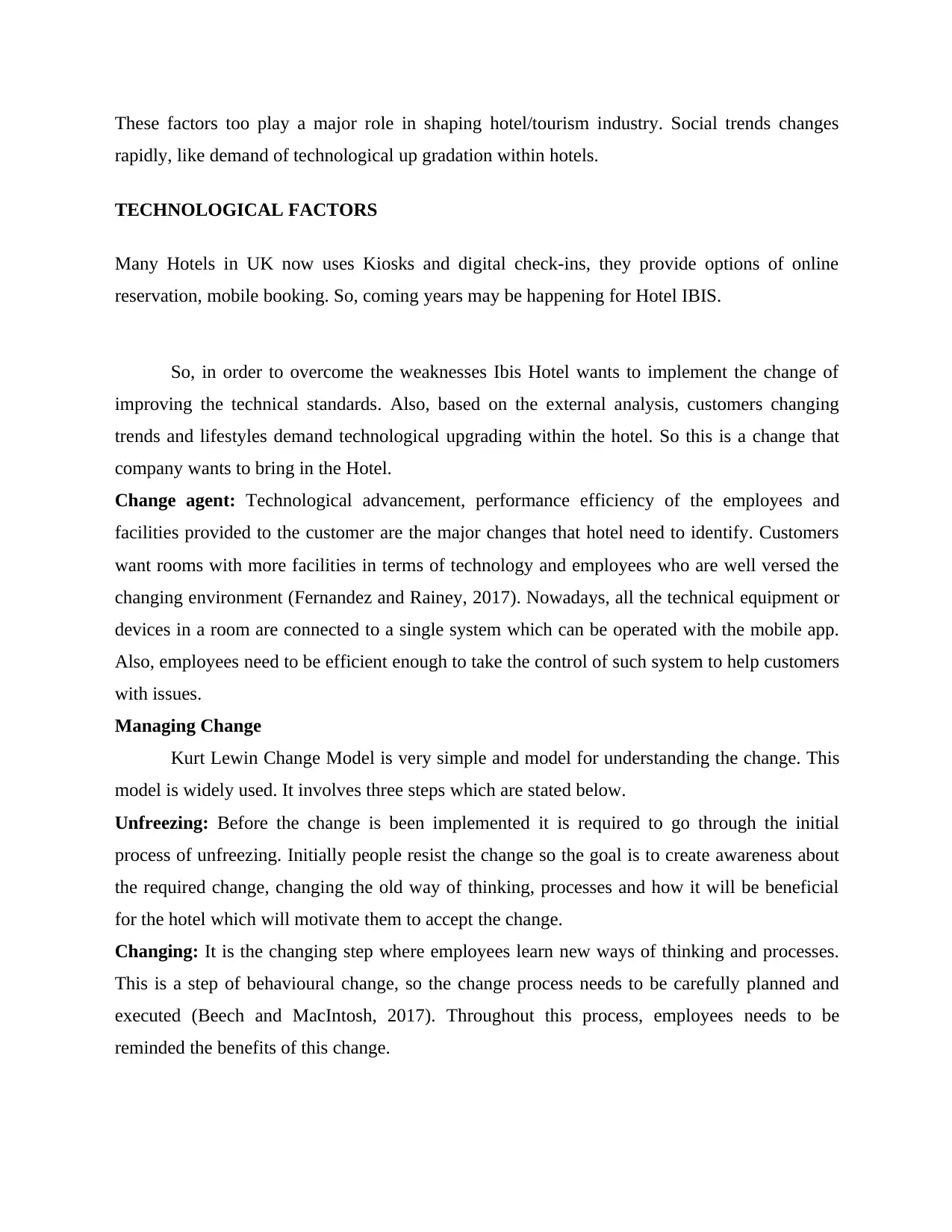
These factors too play a major role in shaping hotel/tourism industry. Social trends changes
rapidly, like demand of technological up gradation within hotels.
TECHNOLOGICAL FACTORS
Many Hotels in UK now uses Kiosks and digital check-ins, they provide options of online
reservation, mobile booking. So, coming years may be happening for Hotel IBIS.
So, in order to overcome the weaknesses Ibis Hotel wants to implement the change of
improving the technical standards. Also, based on the external analysis, customers changing
trends and lifestyles demand technological upgrading within the hotel. So this is a change that
company wants to bring in the Hotel.
Change agent: Technological advancement, performance efficiency of the employees and
facilities provided to the customer are the major changes that hotel need to identify. Customers
want rooms with more facilities in terms of technology and employees who are well versed the
changing environment (Fernandez and Rainey, 2017). Nowadays, all the technical equipment or
devices in a room are connected to a single system which can be operated with the mobile app.
Also, employees need to be efficient enough to take the control of such system to help customers
with issues.
Managing Change
Kurt Lewin Change Model is very simple and model for understanding the change. This
model is widely used. It involves three steps which are stated below.
Unfreezing: Before the change is been implemented it is required to go through the initial
process of unfreezing. Initially people resist the change so the goal is to create awareness about
the required change, changing the old way of thinking, processes and how it will be beneficial
for the hotel which will motivate them to accept the change.
Changing: It is the changing step where employees learn new ways of thinking and processes.
This is a step of behavioural change, so the change process needs to be carefully planned and
executed (Beech and MacIntosh, 2017). Throughout this process, employees needs to be
reminded the benefits of this change.
rapidly, like demand of technological up gradation within hotels.
TECHNOLOGICAL FACTORS
Many Hotels in UK now uses Kiosks and digital check-ins, they provide options of online
reservation, mobile booking. So, coming years may be happening for Hotel IBIS.
So, in order to overcome the weaknesses Ibis Hotel wants to implement the change of
improving the technical standards. Also, based on the external analysis, customers changing
trends and lifestyles demand technological upgrading within the hotel. So this is a change that
company wants to bring in the Hotel.
Change agent: Technological advancement, performance efficiency of the employees and
facilities provided to the customer are the major changes that hotel need to identify. Customers
want rooms with more facilities in terms of technology and employees who are well versed the
changing environment (Fernandez and Rainey, 2017). Nowadays, all the technical equipment or
devices in a room are connected to a single system which can be operated with the mobile app.
Also, employees need to be efficient enough to take the control of such system to help customers
with issues.
Managing Change
Kurt Lewin Change Model is very simple and model for understanding the change. This
model is widely used. It involves three steps which are stated below.
Unfreezing: Before the change is been implemented it is required to go through the initial
process of unfreezing. Initially people resist the change so the goal is to create awareness about
the required change, changing the old way of thinking, processes and how it will be beneficial
for the hotel which will motivate them to accept the change.
Changing: It is the changing step where employees learn new ways of thinking and processes.
This is a step of behavioural change, so the change process needs to be carefully planned and
executed (Beech and MacIntosh, 2017). Throughout this process, employees needs to be
reminded the benefits of this change.
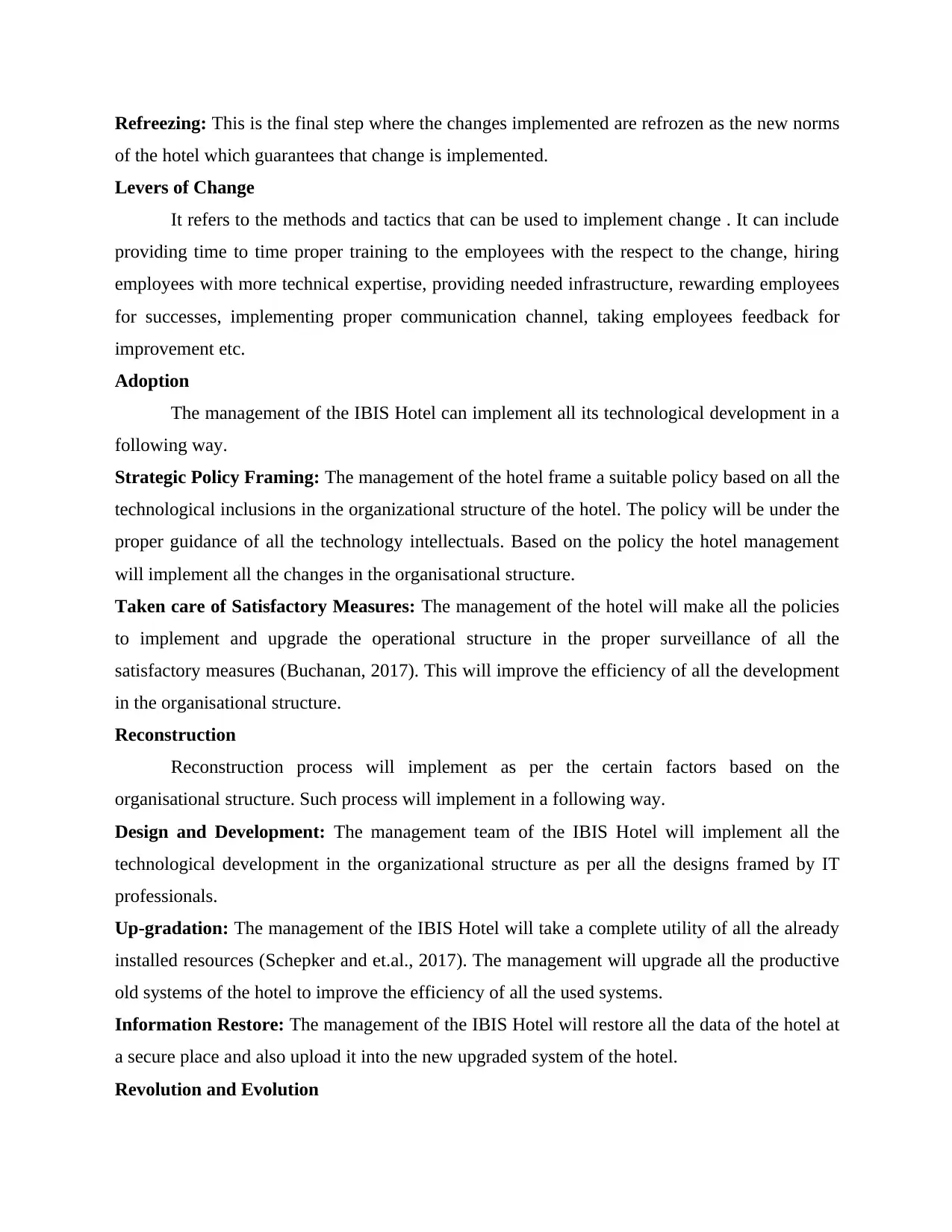
Refreezing: This is the final step where the changes implemented are refrozen as the new norms
of the hotel which guarantees that change is implemented.
Levers of Change
It refers to the methods and tactics that can be used to implement change . It can include
providing time to time proper training to the employees with the respect to the change, hiring
employees with more technical expertise, providing needed infrastructure, rewarding employees
for successes, implementing proper communication channel, taking employees feedback for
improvement etc.
Adoption
The management of the IBIS Hotel can implement all its technological development in a
following way.
Strategic Policy Framing: The management of the hotel frame a suitable policy based on all the
technological inclusions in the organizational structure of the hotel. The policy will be under the
proper guidance of all the technology intellectuals. Based on the policy the hotel management
will implement all the changes in the organisational structure.
Taken care of Satisfactory Measures: The management of the hotel will make all the policies
to implement and upgrade the operational structure in the proper surveillance of all the
satisfactory measures (Buchanan, 2017). This will improve the efficiency of all the development
in the organisational structure.
Reconstruction
Reconstruction process will implement as per the certain factors based on the
organisational structure. Such process will implement in a following way.
Design and Development: The management team of the IBIS Hotel will implement all the
technological development in the organizational structure as per all the designs framed by IT
professionals.
Up-gradation: The management of the IBIS Hotel will take a complete utility of all the already
installed resources (Schepker and et.al., 2017). The management will upgrade all the productive
old systems of the hotel to improve the efficiency of all the used systems.
Information Restore: The management of the IBIS Hotel will restore all the data of the hotel at
a secure place and also upload it into the new upgraded system of the hotel.
Revolution and Evolution
of the hotel which guarantees that change is implemented.
Levers of Change
It refers to the methods and tactics that can be used to implement change . It can include
providing time to time proper training to the employees with the respect to the change, hiring
employees with more technical expertise, providing needed infrastructure, rewarding employees
for successes, implementing proper communication channel, taking employees feedback for
improvement etc.
Adoption
The management of the IBIS Hotel can implement all its technological development in a
following way.
Strategic Policy Framing: The management of the hotel frame a suitable policy based on all the
technological inclusions in the organizational structure of the hotel. The policy will be under the
proper guidance of all the technology intellectuals. Based on the policy the hotel management
will implement all the changes in the organisational structure.
Taken care of Satisfactory Measures: The management of the hotel will make all the policies
to implement and upgrade the operational structure in the proper surveillance of all the
satisfactory measures (Buchanan, 2017). This will improve the efficiency of all the development
in the organisational structure.
Reconstruction
Reconstruction process will implement as per the certain factors based on the
organisational structure. Such process will implement in a following way.
Design and Development: The management team of the IBIS Hotel will implement all the
technological development in the organizational structure as per all the designs framed by IT
professionals.
Up-gradation: The management of the IBIS Hotel will take a complete utility of all the already
installed resources (Schepker and et.al., 2017). The management will upgrade all the productive
old systems of the hotel to improve the efficiency of all the used systems.
Information Restore: The management of the IBIS Hotel will restore all the data of the hotel at
a secure place and also upload it into the new upgraded system of the hotel.
Revolution and Evolution
Secure Best Marks with AI Grader
Need help grading? Try our AI Grader for instant feedback on your assignments.
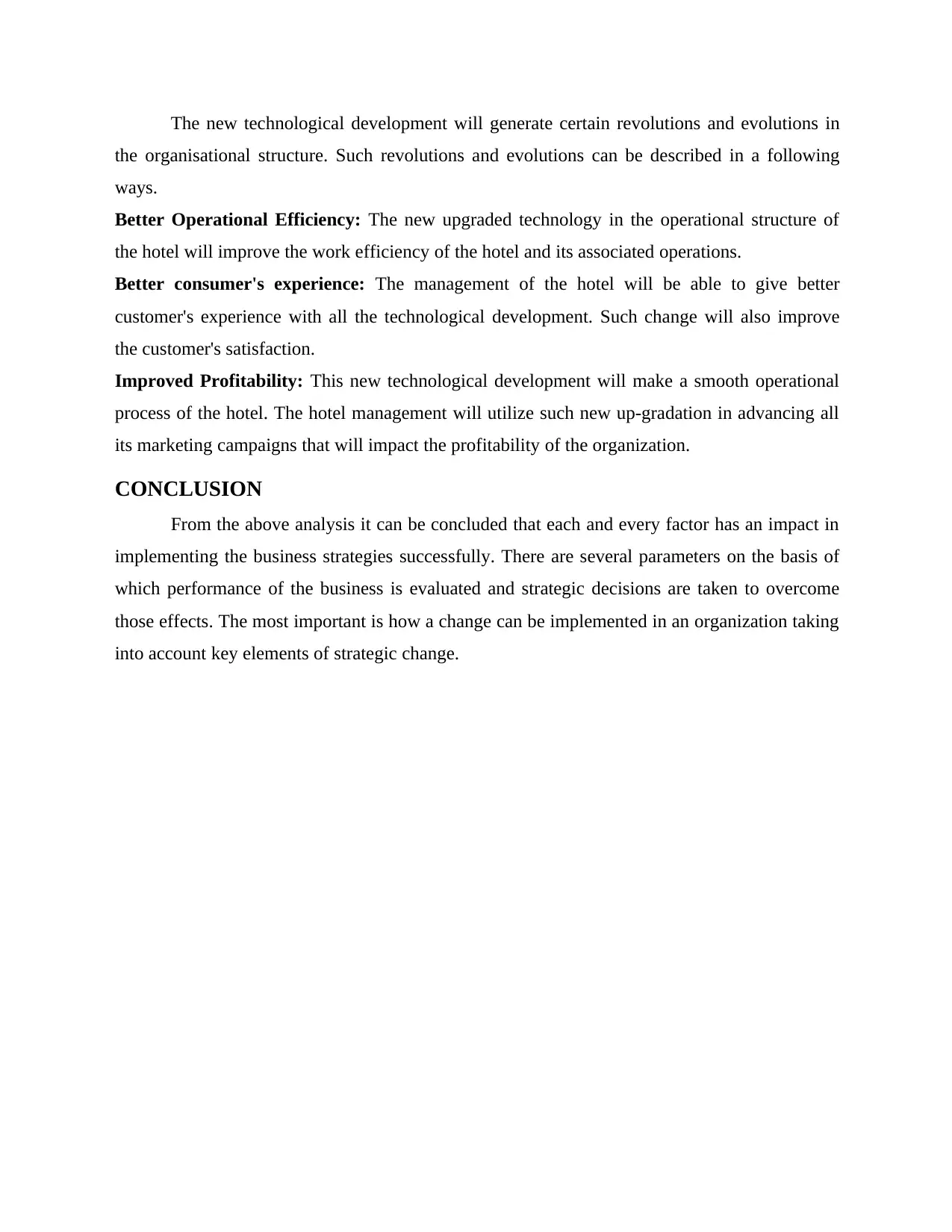
The new technological development will generate certain revolutions and evolutions in
the organisational structure. Such revolutions and evolutions can be described in a following
ways.
Better Operational Efficiency: The new upgraded technology in the operational structure of
the hotel will improve the work efficiency of the hotel and its associated operations.
Better consumer's experience: The management of the hotel will be able to give better
customer's experience with all the technological development. Such change will also improve
the customer's satisfaction.
Improved Profitability: This new technological development will make a smooth operational
process of the hotel. The hotel management will utilize such new up-gradation in advancing all
its marketing campaigns that will impact the profitability of the organization.
CONCLUSION
From the above analysis it can be concluded that each and every factor has an impact in
implementing the business strategies successfully. There are several parameters on the basis of
which performance of the business is evaluated and strategic decisions are taken to overcome
those effects. The most important is how a change can be implemented in an organization taking
into account key elements of strategic change.
the organisational structure. Such revolutions and evolutions can be described in a following
ways.
Better Operational Efficiency: The new upgraded technology in the operational structure of
the hotel will improve the work efficiency of the hotel and its associated operations.
Better consumer's experience: The management of the hotel will be able to give better
customer's experience with all the technological development. Such change will also improve
the customer's satisfaction.
Improved Profitability: This new technological development will make a smooth operational
process of the hotel. The hotel management will utilize such new up-gradation in advancing all
its marketing campaigns that will impact the profitability of the organization.
CONCLUSION
From the above analysis it can be concluded that each and every factor has an impact in
implementing the business strategies successfully. There are several parameters on the basis of
which performance of the business is evaluated and strategic decisions are taken to overcome
those effects. The most important is how a change can be implemented in an organization taking
into account key elements of strategic change.
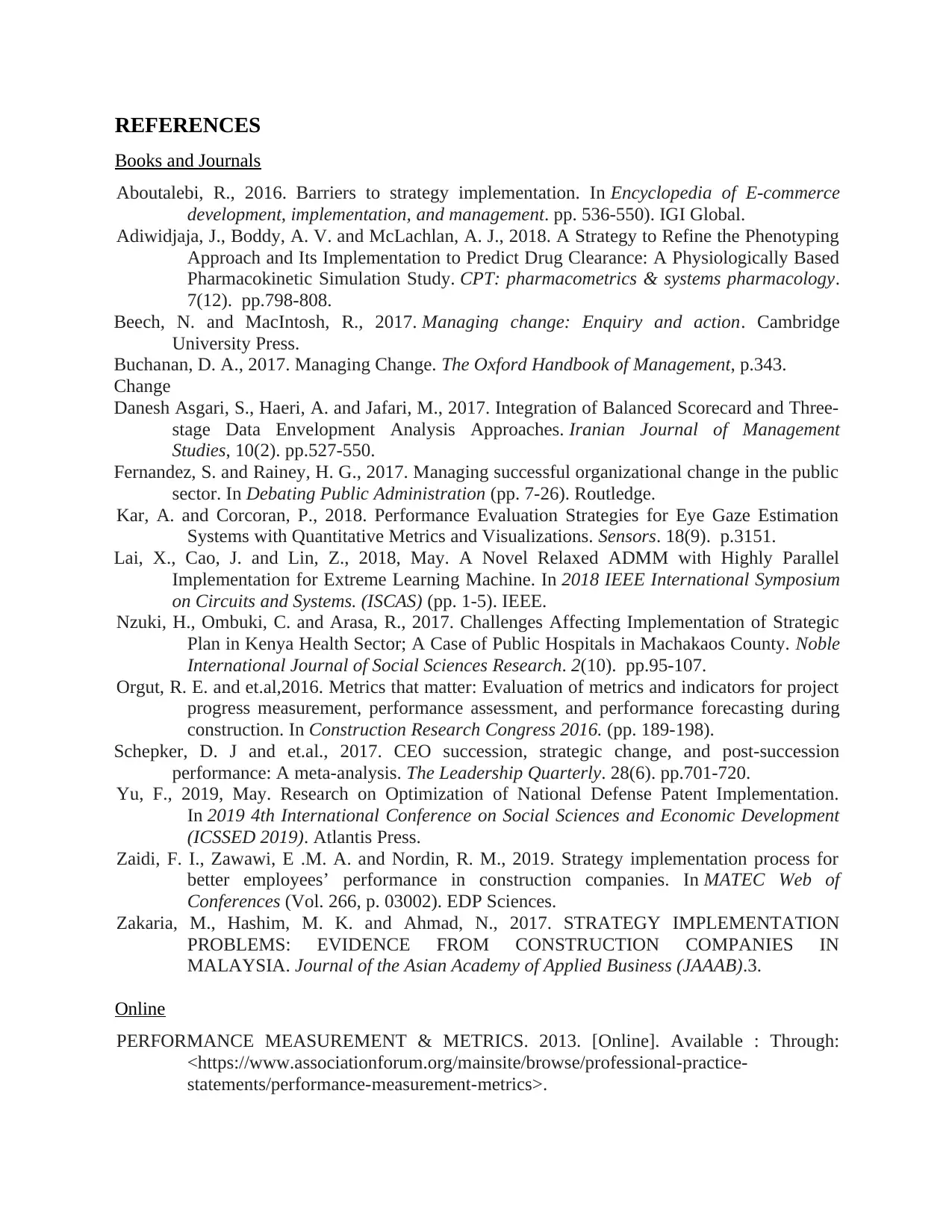
REFERENCES
Books and Journals
Aboutalebi, R., 2016. Barriers to strategy implementation. In Encyclopedia of E-commerce
development, implementation, and management. pp. 536-550). IGI Global.
Adiwidjaja, J., Boddy, A. V. and McLachlan, A. J., 2018. A Strategy to Refine the Phenotyping
Approach and Its Implementation to Predict Drug Clearance: A Physiologically Based
Pharmacokinetic Simulation Study. CPT: pharmacometrics & systems pharmacology.
7(12). pp.798-808.
Beech, N. and MacIntosh, R., 2017. Managing change: Enquiry and action. Cambridge
University Press.
Buchanan, D. A., 2017. Managing Change. The Oxford Handbook of Management, p.343.
Change
Danesh Asgari, S., Haeri, A. and Jafari, M., 2017. Integration of Balanced Scorecard and Three-
stage Data Envelopment Analysis Approaches. Iranian Journal of Management
Studies, 10(2). pp.527-550.
Fernandez, S. and Rainey, H. G., 2017. Managing successful organizational change in the public
sector. In Debating Public Administration (pp. 7-26). Routledge.
Kar, A. and Corcoran, P., 2018. Performance Evaluation Strategies for Eye Gaze Estimation
Systems with Quantitative Metrics and Visualizations. Sensors. 18(9). p.3151.
Lai, X., Cao, J. and Lin, Z., 2018, May. A Novel Relaxed ADMM with Highly Parallel
Implementation for Extreme Learning Machine. In 2018 IEEE International Symposium
on Circuits and Systems. (ISCAS) (pp. 1-5). IEEE.
Nzuki, H., Ombuki, C. and Arasa, R., 2017. Challenges Affecting Implementation of Strategic
Plan in Kenya Health Sector; A Case of Public Hospitals in Machakaos County. Noble
International Journal of Social Sciences Research. 2(10). pp.95-107.
Orgut, R. E. and et.al,2016. Metrics that matter: Evaluation of metrics and indicators for project
progress measurement, performance assessment, and performance forecasting during
construction. In Construction Research Congress 2016. (pp. 189-198).
Schepker, D. J and et.al., 2017. CEO succession, strategic change, and post-succession
performance: A meta-analysis. The Leadership Quarterly. 28(6). pp.701-720.
Yu, F., 2019, May. Research on Optimization of National Defense Patent Implementation.
In 2019 4th International Conference on Social Sciences and Economic Development
(ICSSED 2019). Atlantis Press.
Zaidi, F. I., Zawawi, E .M. A. and Nordin, R. M., 2019. Strategy implementation process for
better employees’ performance in construction companies. In MATEC Web of
Conferences (Vol. 266, p. 03002). EDP Sciences.
Zakaria, M., Hashim, M. K. and Ahmad, N., 2017. STRATEGY IMPLEMENTATION
PROBLEMS: EVIDENCE FROM CONSTRUCTION COMPANIES IN
MALAYSIA. Journal of the Asian Academy of Applied Business (JAAAB).3.
Online
PERFORMANCE MEASUREMENT & METRICS. 2013. [Online]. Available : Through:
<https://www.associationforum.org/mainsite/browse/professional-practice-
statements/performance-measurement-metrics>.
Books and Journals
Aboutalebi, R., 2016. Barriers to strategy implementation. In Encyclopedia of E-commerce
development, implementation, and management. pp. 536-550). IGI Global.
Adiwidjaja, J., Boddy, A. V. and McLachlan, A. J., 2018. A Strategy to Refine the Phenotyping
Approach and Its Implementation to Predict Drug Clearance: A Physiologically Based
Pharmacokinetic Simulation Study. CPT: pharmacometrics & systems pharmacology.
7(12). pp.798-808.
Beech, N. and MacIntosh, R., 2017. Managing change: Enquiry and action. Cambridge
University Press.
Buchanan, D. A., 2017. Managing Change. The Oxford Handbook of Management, p.343.
Change
Danesh Asgari, S., Haeri, A. and Jafari, M., 2017. Integration of Balanced Scorecard and Three-
stage Data Envelopment Analysis Approaches. Iranian Journal of Management
Studies, 10(2). pp.527-550.
Fernandez, S. and Rainey, H. G., 2017. Managing successful organizational change in the public
sector. In Debating Public Administration (pp. 7-26). Routledge.
Kar, A. and Corcoran, P., 2018. Performance Evaluation Strategies for Eye Gaze Estimation
Systems with Quantitative Metrics and Visualizations. Sensors. 18(9). p.3151.
Lai, X., Cao, J. and Lin, Z., 2018, May. A Novel Relaxed ADMM with Highly Parallel
Implementation for Extreme Learning Machine. In 2018 IEEE International Symposium
on Circuits and Systems. (ISCAS) (pp. 1-5). IEEE.
Nzuki, H., Ombuki, C. and Arasa, R., 2017. Challenges Affecting Implementation of Strategic
Plan in Kenya Health Sector; A Case of Public Hospitals in Machakaos County. Noble
International Journal of Social Sciences Research. 2(10). pp.95-107.
Orgut, R. E. and et.al,2016. Metrics that matter: Evaluation of metrics and indicators for project
progress measurement, performance assessment, and performance forecasting during
construction. In Construction Research Congress 2016. (pp. 189-198).
Schepker, D. J and et.al., 2017. CEO succession, strategic change, and post-succession
performance: A meta-analysis. The Leadership Quarterly. 28(6). pp.701-720.
Yu, F., 2019, May. Research on Optimization of National Defense Patent Implementation.
In 2019 4th International Conference on Social Sciences and Economic Development
(ICSSED 2019). Atlantis Press.
Zaidi, F. I., Zawawi, E .M. A. and Nordin, R. M., 2019. Strategy implementation process for
better employees’ performance in construction companies. In MATEC Web of
Conferences (Vol. 266, p. 03002). EDP Sciences.
Zakaria, M., Hashim, M. K. and Ahmad, N., 2017. STRATEGY IMPLEMENTATION
PROBLEMS: EVIDENCE FROM CONSTRUCTION COMPANIES IN
MALAYSIA. Journal of the Asian Academy of Applied Business (JAAAB).3.
Online
PERFORMANCE MEASUREMENT & METRICS. 2013. [Online]. Available : Through:
<https://www.associationforum.org/mainsite/browse/professional-practice-
statements/performance-measurement-metrics>.
1 out of 12
Related Documents
Your All-in-One AI-Powered Toolkit for Academic Success.
+13062052269
info@desklib.com
Available 24*7 on WhatsApp / Email
![[object Object]](/_next/static/media/star-bottom.7253800d.svg)
Unlock your academic potential
© 2024 | Zucol Services PVT LTD | All rights reserved.





